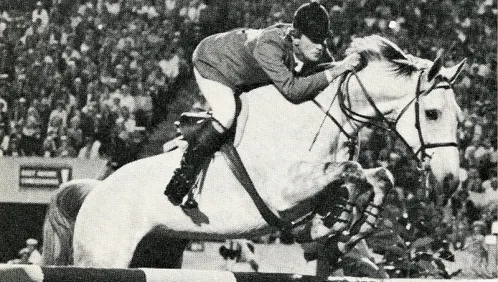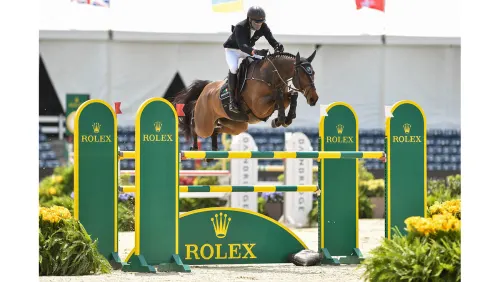The four U.S. riders taking the field in the $75,000 Nations Cup had a serious score to settle.
In the nine years that the Winter Equestrian Festival had hosted a Nations Cup competition, the U.S. team had won only three times—in 2002, 2003 and 2008. Their neighbors to the north, the Canadians, quickly established themselves as the hot favorites each year, winning the title in 2004, ’06, ’07, ’09 and 2010. Ireland won in 2005.
So this year, U.S. Chef d’Equipe George Morris meant business.
“The powers that be don’t give me obvious pressure, but I got a lot of what I’d call ‘indirect rein pressure’ this year,” Morris said. “Some years I have to try to save the older, more experienced horses and riders for other things. You can’t show horses all the time. But this year, we were able to bring some great horses and riders forward. Finally we beat our neighbors to the north, even if it was just by a squeak.”
At the end of the two rounds of competition on March 4 in Wellington, Fla., the U.S. team had just 8 faults, while Canada had accumulated 16 faults for second. The two teams were way ahead of the three teams that tied for third with 37 faults each—Australia, Ireland and Great Britain.
They Meant Business
Veterans McLain Ward and Sapphire led the way for the U.S. team and did just what was expected of them by notching up two clean rounds for the home side. The only other double-clean performance of the night belonged to Aussie James Paterson-Robinson on Niack De L’Abbaye.
“It was difficult. I think it was the hardest Nations Cup I’ve seen here,” said Ward. “Obviously we were a little disappointed with last year’s performance, so we put together a very strong team with four seasoned riders and some exciting new horses along with my veteran, Sapphire. I think they all jumped very well, and it was a good solid win. It’s what we came here to do.”
Joining Ward on the team was his 2010 Alltech FEI World Equestrian Games teammate Mario Deslauriers on Urico, who turned in a four-fault score in Round 1. Since the WEF Nations Cup is a four-star CSIO, only three riders from each team return for Round 2, and all three Round 2 scores count. Morris chose to let Deslauriers and Urico sit out the second round.
ADVERTISEMENT
Veteran riders Beezie Madden and Margie Engle completed the team aboard horses with limited international team experience. Madden rode Coral Reef Via Volo to 4 faults in Round 1 and a clean round in Round 2.
Madden found Coral Reef Via Volo for owners Coral Reef Ranch in early 2010 in hopes of making the WEG team, but didn’t succeed. Madden took the bay mare to Europe in the summer, where she won the Warsteiner Prize at the Aachen CHIO (Germany) and earned ribbons at Dublin (Ireland) and Valkenswaard (the Netherlands). They helped the U.S. team win the Nations Cup at the Spruce Meadows Masters (Alta.) in September.
Madden planned her winter circuit with the Nations Cup in mind. “We all made a big effort this year to make this class a high priority. It was important to try to win tonight, and we pulled it off,” Madden said.
Engle has been riding the powerful gray Indigo for a year, and she’s already picked up quite a few wins with him. The WEF Nations Cup was the first team appearance for Indigo, though Engle is an Olympic Games team veteran. Engle and Indigo put in a brilliant clear go in the first round and were on their way to a second clear in Round 2 until the last fence.
Course designer Steve Stephens set a last line for the Nations Cup that caused a lot of conversation in the course walk. An airy arched wall was set a bending 11 or 12 strides before the last oxer, which was over a liverpool. The wall had three panels, with lower sides and a higher section in the middle.
Engle and Indigo jumped the wall, then seemed to have some miscommunication on the way to the last oxer, resulting in the back rail coming down.
“It wasn’t his fault. I jumped the wall, and then I kind of relaxed and didn’t really give him the direction he needed,” Engle said. “He got a little lost for a minute—I think he thought he was finished and got a bit confused.”
Thinking Ahead
On the course walk, Canadian team members Eric Lamaze and Ian Millar spent a lot of time discussing that last line. Canada was fielding a team of experienced riders like Lamaze and Millar on younger horses—Sidoline Van De Centaur and Star Power—along with Millar’s son, Jonathon, and Canadian national champion Yann Candele on Pitareusa.
ADVERTISEMENT
“When we saw the line-up for the U.S. team, we knew they weren’t fooling around. It felt like we were going into battle with giants, so we were fairly happy to come out intact, so to speak,” Ian said.
Ian and Star Power turned in two four-fault rounds, while Candele was the drop score of 8 from Round 1 and didn’t return for Round 2. Jonathon rode Contino 14 to 4 faults in Round 1, then a clear round in Round 2. And Lamaze and the cat-like little Sidoline Van De Centaur were clear in the first round and had just one rail in Round 2.
“We all look forward to this night in Palm Beach so much. It’s a night we enjoy,” said Ian.
U.S.-based riders made up the Irish team that tied for third. Darragh Kenny rides for Missy Clark and John Brennan of North Run in Vermont, while Paul O’Shea debuted on the WEF circuit this year, riding for owner Harry Gill of Pennsylvania. Jennifer Crooks runs a training farm in Idaho, and Shane Sweetnam has a farm in Wellington, Fla.
Great Britain’s Nick Skelton is a familiar face at WEF, since he’s wintered in Florida for many years. He rode Carlo to a four-fault first round and a clean Round 2. His teammate Ben Maher has also competed in Florida before and has a team appearance at the 2008 Olympic Games in Hong Kong on his resume.
But the other two Brits on the team were younger, less experienced riders. Scott Brash rode Bon Ami to 13 faults in Round 1 and didn’t return for Round 2. Gemma Paternoster turned in scores of 8 and 9 faults.
“We’re trying to find horses for European tour and thinking ahead to [the 2012 Olympic Games in] London,” said British Chef d’Equipe Rob Hoekstra. “We had three riders under 30 on the team, so it was very exciting for them.”
The Australians are also making plans for 2012 and came to the Nations Cup to see how three U.S.-based Aussie riders are doing. Harley Brown, who lives in California, rode Cassiato to 4 and 13 faults. Thaisa Erwin is based at the Apex Equestrian Center in North Carolina with her German husband, Matthias Holberg. And Damian Guthrie lives in Ocala, Fla.
“For us it’s been a bit of a discovery tour—we haven’t been able to spend much time with the riders we have who are based in North America, and there are a few riders here who have the potential to be possibilities for the 2012 Games,” said Australian Chef d’Equipe Matt Williams.
Paterson-Robinson’s brilliant double-clear performance aboard Niack De L’Abbaye was the bright spot of the Aussie effort. Paterson-Robinson has been based out of Europe for 10 years and now lives in the Netherlands, producing horses out of Ger Poels’s farm. He and Niack De L’Abbaye were on the seventh-placed Australian team at the 2010 WEG.















